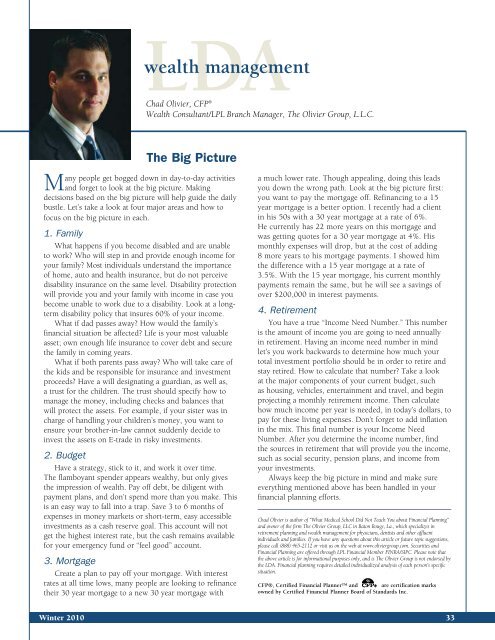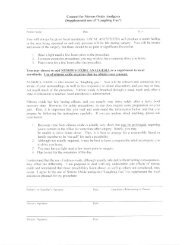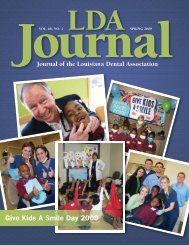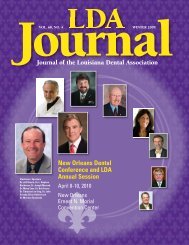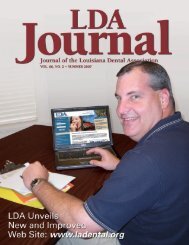Journal of the Louisiana Dental Association Journal of the Louisiana ...
Journal of the Louisiana Dental Association Journal of the Louisiana ...
Journal of the Louisiana Dental Association Journal of the Louisiana ...
You also want an ePaper? Increase the reach of your titles
YUMPU automatically turns print PDFs into web optimized ePapers that Google loves.
LDA<br />
wealth management<br />
Chad Olivier, CFP ®<br />
Wealth Consultant/LPL Branch Manager, The Olivier Group, L.L.C.<br />
The Big Picture<br />
Many people get bogged down in day-to-day activities<br />
and forget to look at <strong>the</strong> big picture. Making<br />
decisions based on <strong>the</strong> big picture will help guide <strong>the</strong> daily<br />
bustle. Let’s take a look at four major areas and how to<br />
focus on <strong>the</strong> big picture in each.<br />
1. Family<br />
What happens if you become disabled and are unable<br />
to work? Who will step in and provide enough income for<br />
your family? Most individuals understand <strong>the</strong> importance<br />
<strong>of</strong> home, auto and health insurance, but do not perceive<br />
disability insurance on <strong>the</strong> same level. Disability protection<br />
will provide you and your family with income in case you<br />
become unable to work due to a disability. Look at a longterm<br />
disability policy that insures 60% <strong>of</strong> your income.<br />
What if dad passes away? How would <strong>the</strong> family’s<br />
financial situation be affected? Life is your most valuable<br />
asset; own enough life insurance to cover debt and secure<br />
<strong>the</strong> family in coming years.<br />
What if both parents pass away? Who will take care <strong>of</strong><br />
<strong>the</strong> kids and be responsible for insurance and investment<br />
proceeds? Have a will designating a guardian, as well as,<br />
a trust for <strong>the</strong> children. The trust should specify how to<br />
manage <strong>the</strong> money, including checks and balances that<br />
will protect <strong>the</strong> assets. For example, if your sister was in<br />
charge <strong>of</strong> handling your children’s money, you want to<br />
ensure your bro<strong>the</strong>r-in-law cannot suddenly decide to<br />
invest <strong>the</strong> assets on E-trade in risky investments.<br />
2. Budget<br />
Have a strategy, stick to it, and work it over time.<br />
The flamboyant spender appears wealthy, but only gives<br />
<strong>the</strong> impression <strong>of</strong> wealth. Pay <strong>of</strong>f debt, be diligent with<br />
payment plans, and don’t spend more than you make. This<br />
is an easy way to fall into a trap. Save 3 to 6 months <strong>of</strong><br />
expenses in money markets or short-term, easy accessible<br />
investments as a cash reserve goal. This account will not<br />
get <strong>the</strong> highest interest rate, but <strong>the</strong> cash remains available<br />
for your emergency fund or “feel good” account.<br />
3. Mortgage<br />
Create a plan to pay <strong>of</strong>f your mortgage. With interest<br />
rates at all time lows, many people are looking to refinance<br />
<strong>the</strong>ir 30 year mortgage to a new 30 year mortgage with<br />
a much lower rate. Though appealing, doing this leads<br />
you down <strong>the</strong> wrong path. Look at <strong>the</strong> big picture first:<br />
you want to pay <strong>the</strong> mortgage <strong>of</strong>f. Refinancing to a 15<br />
year mortgage is a better option. I recently had a client<br />
in his 50s with a 30 year mortgage at a rate <strong>of</strong> 6%.<br />
He currently has 22 more years on this mortgage and<br />
was getting quotes for a 30 year mortgage at 4%. His<br />
monthly expenses will drop, but at <strong>the</strong> cost <strong>of</strong> adding<br />
8 more years to his mortgage payments. I showed him<br />
<strong>the</strong> difference with a 15 year mortgage at a rate <strong>of</strong><br />
3.5%. With <strong>the</strong> 15 year mortgage, his current monthly<br />
payments remain <strong>the</strong> same, but he will see a savings <strong>of</strong><br />
over $200,000 in interest payments.<br />
4. Retirement<br />
You have a true “Income Need Number.” This number<br />
is <strong>the</strong> amount <strong>of</strong> income you are going to need annually<br />
in retirement. Having an income need number in mind<br />
let’s you work backwards to determine how much your<br />
total investment portfolio should be in order to retire and<br />
stay retired. How to calculate that number? Take a look<br />
at <strong>the</strong> major components <strong>of</strong> your current budget, such<br />
as housing, vehicles, entertainment and travel, and begin<br />
projecting a monthly retirement income. Then calculate<br />
how much income per year is needed, in today’s dollars, to<br />
pay for <strong>the</strong>se living expenses. Don’t forget to add inflation<br />
in <strong>the</strong> mix. This final number is your Income Need<br />
Number. After you determine <strong>the</strong> income number, find<br />
<strong>the</strong> sources in retirement that will provide you <strong>the</strong> income,<br />
such as social security, pension plans, and income from<br />
your investments.<br />
Always keep <strong>the</strong> big picture in mind and make sure<br />
everything mentioned above has been handled in your<br />
financial planning efforts.<br />
Chad Olivier is author <strong>of</strong> “What Medical School Did Not Teach You about Financial Planning”<br />
and owner <strong>of</strong> <strong>the</strong> firm The Olivier Group, LLC in Baton Rouge, La., which specializes in<br />
retirement planning and wealth management for physicians, dentists and o<strong>the</strong>r affluent<br />
individuals and families. If you have any questions about this article or future topic suggestions,<br />
please call (888) 465-2112 or visit us on <strong>the</strong> web at www.oliviergroup.com. Securities and<br />
Financial Planning are <strong>of</strong>fered through LPL Financial Member FINRA/SIPC. Please note that<br />
<strong>the</strong> above article is for informational purposes only, and is The Olivier Group is not endorsed by<br />
<strong>the</strong> LDA. Financial planning requires detailed individualized analysis <strong>of</strong> each person’s specific<br />
situation.<br />
CFP®, Certified Financial Planner and are certification marks<br />
owned by Certified Financial Planner Board <strong>of</strong> Standards Inc.<br />
Winter 2010 33


